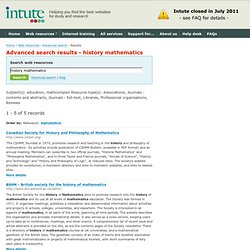

Philosophy of Mathematics Education Journal edited by Paul Ernest. Welcome to PAUL ERNEST'S page Based at School of Education, University of Exeter, United Kingdom.
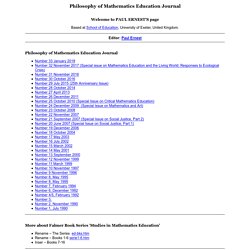
Philosophy of Mathematics Education Journal More about Falmer Book Series 'Studies in Mathematics Education' Rename – The Series ed-bks.htm Rename – Books 1-6 serie1-6.htm Inser – Books 7-16 Advanced Study in Mathematics Education at Exeter Papers by Paul Ernest To contact Paul Ernest please mail to p.ernest@exeter.ac.uk Copyright Notice. Philosophy of Mathematics Education Journal edited by Paul Ernest. Why Manage Data? - The University of North Carolina at Chapel Hill, The University of Edinburgh. Why Manage Data? - The University of North Carolina at Chapel Hill, The University of Edinburgh. Design & Document Survey Questionnaires from Scratch.
Ask an Expert for Help Researchers reusing data often want information on how data were collected.
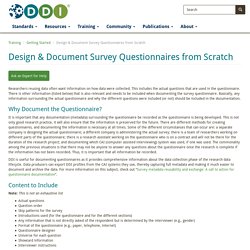
This includes the actual questions that are used in the questionnaire. There is other information (listed below) that is also relevant and needs to be included when documenting the survey questionnaire. Basically, any information surrounding the actual questionnaire and why the different questions were included (or not) should be included in the documentation. Why Document the Questionnaire? It is important that any documentation (metadata) surrounding the questionnaire be recorded as the questionnaire is being developed. DDI is useful for documenting questionnaires as it provides comprehensive information about the data collection phase of the research data lifecycle. Content to Include Note: This is not an exhaustive list Use Cases and Examples The figure below is from the “Canadian General Social Survey, Cycle 25, 2011”. The metadata in this figure includes: Getting Started Tools.
Untitled. Our Mission. Archives. DigiTool - Search. Cobb, Stephan, McClain, & Gravemeijer (2001) - MathEd.net Wiki. Cobb, Stephan, McClain, & Gravemeijer (2001) Participating in Classroom Mathematical Practices Abstract In this article, we describe a methodology for analyzing the collective learning of the classroom community in terms of the evolution of classroom mathematical practices.
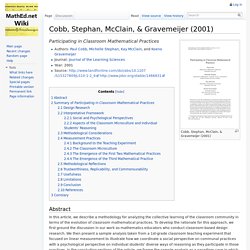
To develop the rationale for this approach, we first ground the discussion in our work as mathematics educators who conduct classroom-based design research. We then present a sample analysis taken from a 1st-grade classroom teaching experiment that focused on linear measurement to illustrate how we coordinate a social perspective on communal practices with a psychological perspective on individual students' diverse ways of reasoning as they participate in those practices. Summary of Participating in Classroom Mathematical Practices In this article, Cobb et al. describe the type of design research they conducted with 1st grade students to study the evolution of classroom mathematical practices.
Methods Map. What we can learn from analyzing the teacher’s role in collective argumentation. Erna Yackel, Department of Mathematics, Computer Science, and Statistics, Purdue University Calumet, Hammond, IN 46323, USA Available online 12 November 2002 Choose an option to locate/access this article: Check if you have access through your login credentials or your institution Check access Get rights and content Abstract.
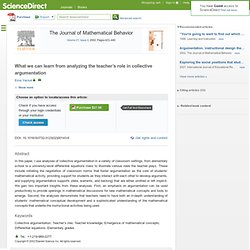
Empirical studies - Empirical studies - Course & Research Guides at University of Wisconsin-Eau Claire. Choose the Best Search for Your Information Need. Search Results. Research and Documentation Online 5th Edition. Education Index.
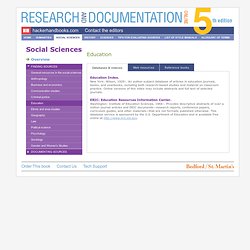
Evaluation Support. ESF is developing its activities to become a high quality international evaluation service provider, providing excellence in basic research, development and innovation.
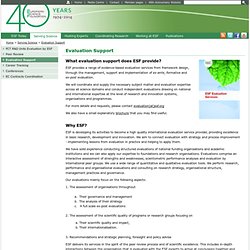
We aim to connect evaluation with strategy and process improvement - implementing lessons from evaluation in practice and helping to apply them. We have solid experience conducting structured evaluations of national funding organisations and academic institutions and we can also apply our expertise to foundations and research organisations.
Evaluations comprise an interactive assessment of strengths and weaknesses, scientometric performance analyses and evaluation by international peer groups. We use a wide range of quantitative and qualitative evaluation tools. We perform research, performance and organisational evaluations and consulting on research strategy, organisational structure, management practices and governance. Our evaluations mainly focus on the following aspects: 1. A. 2. A. 3. OWL. Coming Soon: A new look for our same great content! We're working hard this summer on a redesign of the Purdue OWL. Worry not! Our navigation menu and content will remain largely the same. If you are having trouble locating a specific resource, please visit the search page or the Site Map.
The Online Writing Lab (OWL) at Purdue University houses writing resources and instructional material, and we provide these as a free service of the Writing Lab at Purdue. For more information about services for the Purdue University community, including one-to-one consultations, ESL conversation groups and workshops, please visit the Writing Lab site. Mission. Search Results. Showing 1 to 15 of 81 results Burns, Barbara A. – Issues in the Undergraduate Mathematics Preparation of School Teachers, 2010 The history of mathematics is an important component in the learning of mathematics.
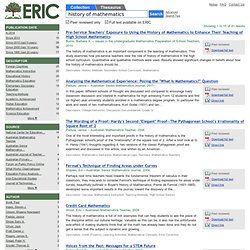
This study examines how pre-service teachers view the role of history of mathematics in the high school curriculum. Quantitative and qualitative methods were used. Results showed significant changes in beliefs about how the history of mathematics should be… Advanced search results. Subject(s): education, mathcompsci Resource type(s): Associations, Journals - contents and abstracts, Journals - full-text, Libraries, Professional organisations, Reviews.
